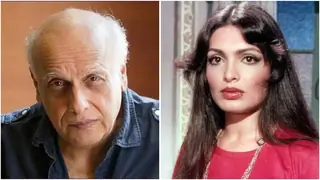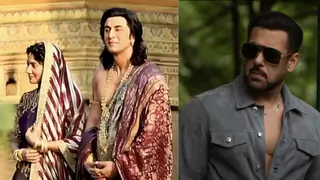Tu Meri Poori Kahani Review: Bhatt Cinema Finds Its Echo in a Daughter’s Untold Story
The film dares to ask the questions most of us never do. What if she had chosen differently? What if ambition won over love? What if she lived her story entirely on her own terms?
Published: Friday,Sep 26, 2025 06:18 AM GMT+05:30

Cinema has always been Mahesh Bhatt’s chosen canvas for turning life into stories, and with Tu Meri Poori Kahani he finds yet another way to blur the line between memory and imagination. The film, which introduces newcomers Hirranya Ojha and Arhaan Patel under the gentle yet assured direction of debutant Suhrita Das, carries a deep emotional undercurrent.
At its heart, it feels like a cinematic letter from father to daughter, a tribute to Pooja Bhatt and a life altering decision she once made.
Years ago, when Mahesh Bhatt offered Pooja the lead in Aashiqui, she famously said no. The reason was not a lack of interest but love. Her then boyfriend asked her to step away from films, and she chose him over a career defining role. That one decision rewrote her path.
She later admitted feeling the pangs of missing out when Aashiqui became a cultural phenomenon, but also realised that her true calling lay in carving out her own artistic and ambitious identity.
Tu Meri Poori Kahani spins that moment into a fictional narrative. It dares to ask the questions most of us never do. What if she had chosen differently? What if ambition won over love? What if she lived her story entirely on her own terms?
The Story and Its Fabric

The film follows Anicka, played by Hirranya Ojha, a rebellious and outspoken young woman with stardom in her eyes. Her world collides with Rohan, played by Arhaan Patel, a subway singer whose music becomes both her inspiration and her mirror. Their relationship anchors the story, but around them swirl family conflicts, fragile ambitions, and the constant pull between love and personal aspiration.
Anicka’s complicated relationship with her father, played by Tigmanshu Dhulia, is the film’s emotional core. He represents stern disapproval, tradition, and control. In contrast, her mother, played by Juhi Babbar, embodies unconditional warmth and support. Through them, the screenplay captures a universal tension: the parental divide between protecting a child and letting them chase their own fire.
In execution, the film feels like a rebirth of Bhatt cinema. It is intimate, raw, steeped in moral dilemmas and human frailty, yet seen through the fresh lens of Suhrita Das.
Performances that Carry the Film

As Anicka, Hirranya Ojha makes a confident debut. She brings a balance of fierceness and fragility, portraying both the hunger for recognition and the vulnerability of love. There is a spark in her screen presence that makes her a natural fit for the Bhatt school of heroines, who are always complex, messy, and deeply human.
Arhaan Patel’s Rohan is equally compelling. His charm and sincerity make him more than just a love interest. He is the voice and conscience of the story, especially through the title track Tu Meri Poori Kahani. Their chemistry feels organic, flowing with ease rather than being forced.
Shammi Duhan’s Raj stands out as the film’s obsessive antagonist, echoing the shadowy villains that have always haunted Bhatt narratives. Meanwhile, Tigmanshu Dhulia and Juhi Babbar ground the drama with gravitas and tenderness. Together, the cast creates a layered emotional landscape.
Suhrita Das and the Weight of a Legacy

Suhrita Das’s debut direction is quietly remarkable. She steps into the daunting space of Bhatt family storytelling and manages to make it her own. Much like how Mohit Suri once carried forward the Bhatt legacy with films like Saaya and Zeher, Suhrita emerges as a fresh torchbearer of cinema that is personal, emotionally raw, and unafraid to ask difficult questions.
Music as the Soul of the Story
No Bhatt film is complete without music that lingers, and Anu Malik’s soundtrack does exactly that. The haunting title track is the heartbeat of the film, and songs like Yeh Ishq Hai blend seamlessly into the storytelling, much like Aashiqui once did. The music here is not decorative but woven into the film’s very identity.
A Tribute Beyond Fiction
What elevates Tu Meri Poori Kahani is its emotional truth. More than a fictional story, it feels like a father’s dialogue with his daughter. Mahesh Bhatt has always transformed personal wounds into powerful art, and this film is no exception. It imagines the path Pooja never walked but does so with respect, affection, and a lingering question. What if she had taken that role and chosen ambition over love? Would this have been her kahani?
Mahesh Bhatt’s Tu Meri Poori Kahani is more than just a film launchpad for Hirranya Ojha and Arhaan Patel. It is a reimagining of a choice Pooja Bhatt once made, a blend of raw storytelling, soulful music, and heartfelt performances. But does this tribute truly capture the Bhatt legacy while standing on its own? Read our full review.
Join Our WhatsApp Channel
Stay updated with the latest news, gossip, and hot discussions. Be a part of our WhatsApp family now!
Join NowYour reaction
 Nice
Nice Great
Great Loved
Loved LOL
LOL OMG
OMG Cry
Cry Fail
Fail
















Post a comment